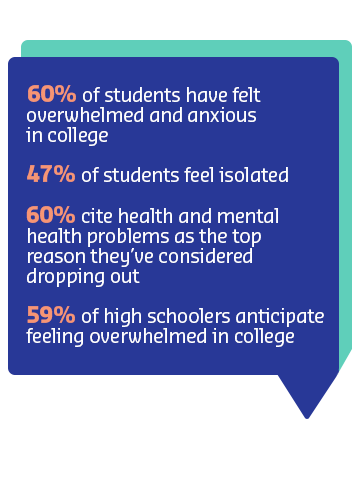Overcoming the Mental Health Crisis Among Students

College students are often depicted in movies, television shows and other media as the epitome of carefree youth: hanging out with friends, hopping from one party to the next, and relishing a period in which they’re still relatively unencumbered by life’s challenges and demands. But many young people today face a starkly different reality as they struggle with the ongoing effects of mental health issues, such as depression, anxiety, social isolation and more. For some students, these issues take root before they even arrive on campus for the first day of orientation.
The latest chapter of the President to President thought leadership series, titled “University Stewardship of a Healing Community,” examines how trauma early in life can contribute to mental health struggles down the road. East Tennessee State University President Brian Noland, Ph.D., examines the prevalence and impacts of Adverse Childhood Experiences (ACEs) and advocates for trauma-informed care to help those affected overcome the many challenges that early trauma leaves in its wake. He describes how the pandemic exposed severe flaws in the way higher education leaders address mental health concerns among students, and he shares strategies his campus has implemented to try to alleviate these issues.

Dr. Noland’s chapter underscores how essential it is to support students’ mental health, enabling them to achieve academic, personal and professional success. Unfortunately, there are still many gaps to fill. Sodexo’s 2022-2023 Student Lifestyle Survey revealed insights regarding college students’ mental health and their ongoing concerns about managing their well-being.
The key takeaway: students are struggling. The good news, though, is that college campuses and their partners can play an essential role in helping students build resilience and overcome challenges by offering the mental health support and social development opportunities they need.
Graphic: 60% of students have felt overwhelmed and anxious in college, 47% of students feel isolated, 60% cite health and mental health problems as the top reason they’ve considered dropping out, 59% of high schoolers anticipate feeling overwhelmed in college.
Mental Health Concerns Are a Pervasive Issue
Since the pandemic began, there has been a substantial spike in the number of students experiencing anxiety and other mental health concerns. More than 60% of today’s students report having felt overwhelmed and anxious while in college, compared to 40% of students attending college in 2020. Additionally, students report that loneliness is on the rise, increasing 65% since 2020.
These issues can have immense consequences, even leading students to abandon their pursuit of higher education. The Student Lifestyle Survey found that among the one-third of students who have considered dropping out, 60% cite health and mental health problems as their top reason. In 2017, students considering dropping out reported that financial issues were their top reason, illustrating the growing urgency around mental health concerns.
For many students, these issues start before they even arrive on campus. Among the college-bound high school students we surveyed, 59% anticipate feeling overwhelmed in college. These students haven’t even finished high school yet, and they’re already stressed about managing campus life.
Providing the Resources Students Need Now
Students know they need help. They struggle to build the skills they need to manage their time, handle stress and achieve overall well-being while in college, and they’re looking for a campus that prioritizes their well-being by offering the right tools and support. However, students are not confident that their campuses are prepared to meet their needs, with less than half of students believing that their college would sufficiently support them through physical and mental health issues.
Campuses can overcome this perceived lack of support and encourage student resilience by serving as an ally for overall student wellness. Examples may include coaching and guidance to help students master life skills and providing more outlets for stress release. It’s also essential to ensure students feel welcome on campus — 82% of students state that a friendly atmosphere is the most important factor when choosing a college. They want a campus environment where they feel a sense of belonging, as well as reassurance that support will be available when they need it.
Campus Dining Drives Social Connection
With more than half of students surveyed feeling lonely and nearly that many feeling isolated, it’s crucial to offer ample opportunities for students to connect and form relationships on campus. Students agree that dining together on campus is an excellent way to build and strengthen connections with their peers. In fact, 87% of students report that eating together is the most typical way that they socialize with friends, making campus dining a top driver of social engagement.
There’s even a relationship between meal plan participation and a sense of connection on campus. While only 19% of students who are not on a meal plan feel extremely engaged with their campus communities, 35% of students who are on a meal plan feel that way. Meal plan participants also report higher satisfaction with their social lives, lower levels of anxiety and higher satisfaction with the availability of stress-relief outlets on campus. Dining with friends on campus contributes to an overall sense of well-being for students.